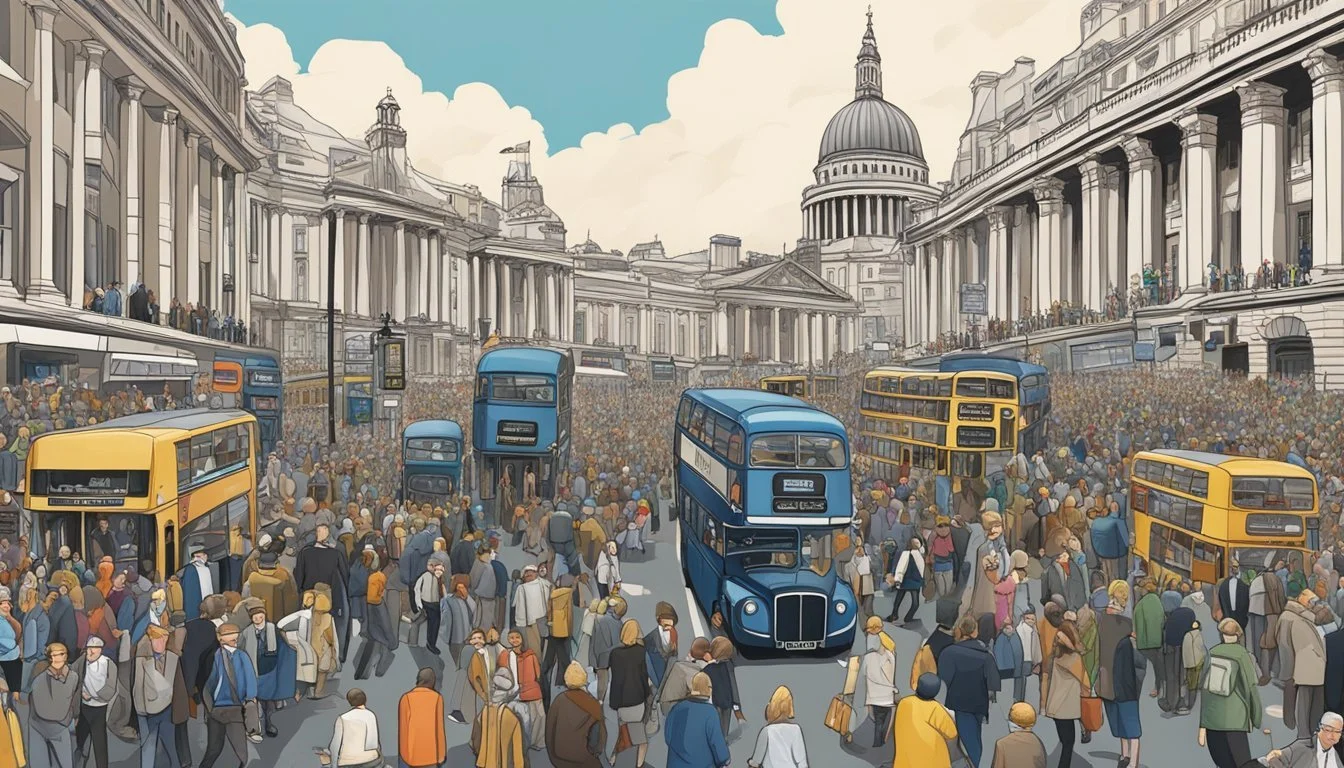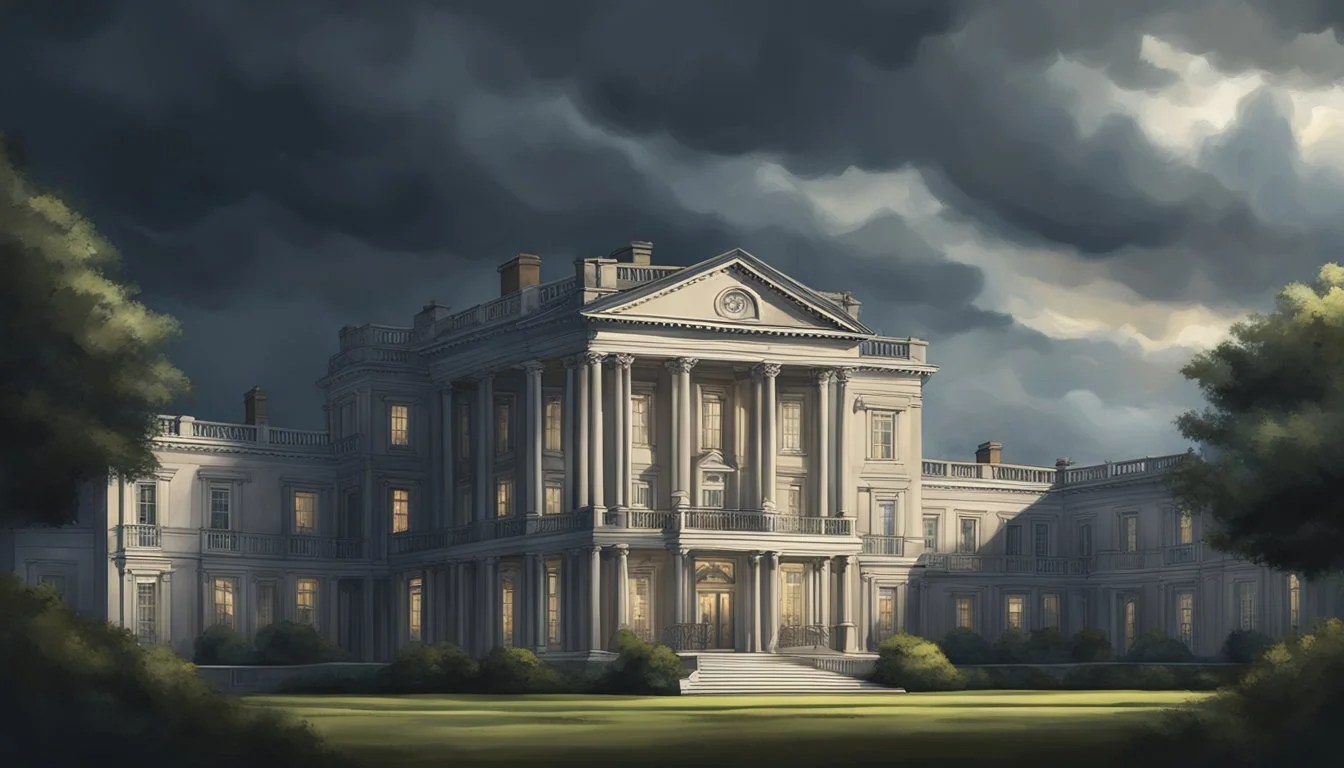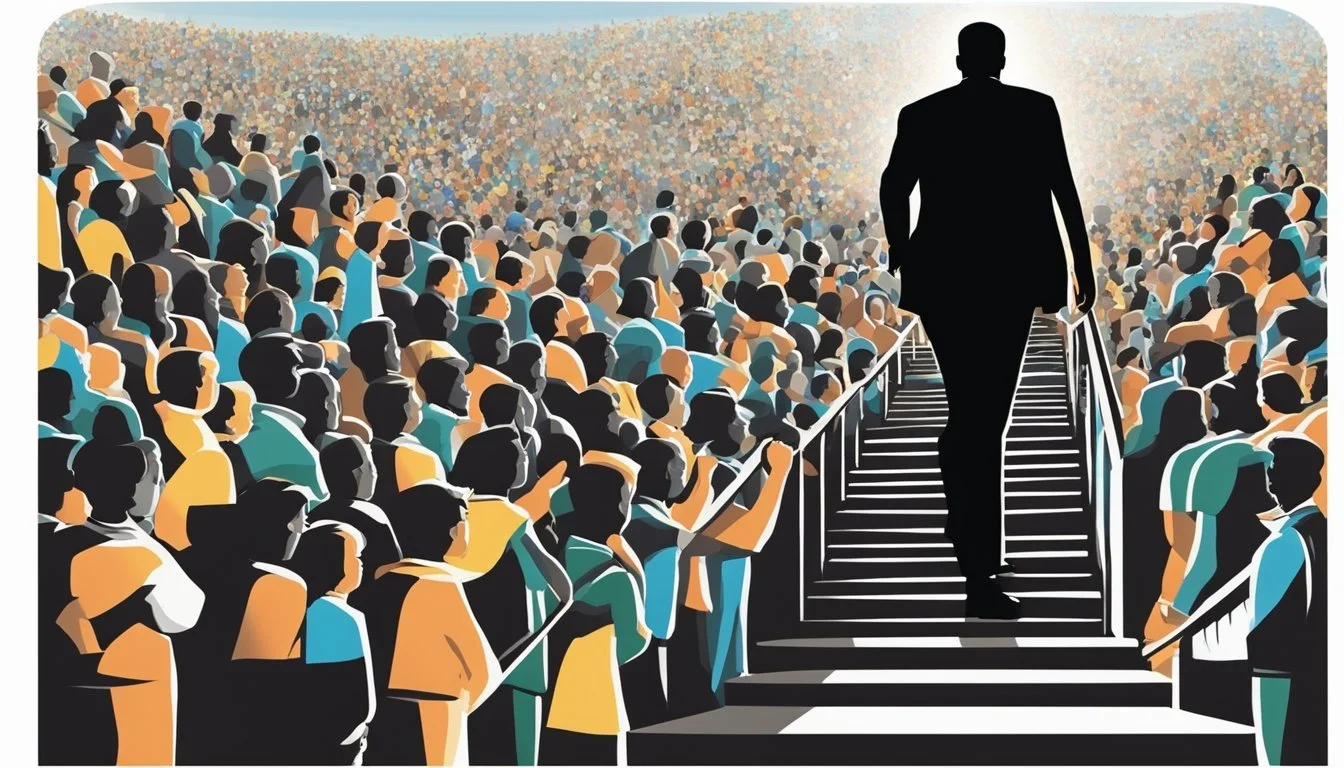Iron Lady Rising: 6 Films on Thatcher's Path to Power
Cinematic Journey Through British Political History
Margaret Thatcher, Britain's first female Prime Minister, left an indelible mark on British politics and society. Her rise to power and tenure as the "Iron Lady" have been the subject of numerous films, documentaries, and dramatizations over the years.
Six notable films capture key moments in Thatcher's ascent to leadership and her time at 10 Downing Street. These works provide different perspectives on her political career, personal life, and the impact of her policies on the United Kingdom. From biographical dramas to historical recreations, each film offers unique insights into the woman who shaped modern British conservatism.
1) The Iron Lady (2011)
The Iron Lady is a biographical drama film directed by Phyllida Lloyd. It depicts the life and political career of Margaret Thatcher, Britain's first female Prime Minister.
Meryl Streep delivers a powerful performance as Thatcher, capturing her determination and controversial leadership style. The film alternates between Thatcher's later years and flashbacks to her rise to power.
Jim Broadbent plays Denis Thatcher, Margaret's supportive husband. The movie explores their relationship and how it shaped her political journey.
The film covers key moments in Thatcher's career, including her election as Prime Minister and her handling of the Falklands War. It also touches on the challenges she faced as a woman in a male-dominated political sphere.
While praised for Streep's acting, the film received mixed reviews for its portrayal of Thatcher's policies and legacy. It offers a personal look at the woman behind the "Iron Lady" moniker.
Learn more about The Iron Lady (2011)
2) Thatcher: The Final Days (1991)
This television film depicts the events leading to Margaret Thatcher's resignation as Prime Minister in 1990. Produced by Granada Television for ITV, it first aired on September 11, 1991.
Sylvia Syms portrays Thatcher in this dramatic recreation of her final days in office. The film explores the political maneuvering and behind-the-scenes drama that ultimately led to her downfall.
Director Tim Sullivan brings to life Richard Maher's script, focusing on the intense political climate and internal party conflicts. The film offers a glimpse into the high-stakes world of British politics during this pivotal moment in history.
"Thatcher: The Final Days" provides viewers with a dramatized account of the Iron Lady's last moments as the leader of the United Kingdom. It showcases the tension and complexity of political power struggles at the highest levels of government.
IMDb: Thatcher: The Final Days
3) The Falklands Play (2002)
The Falklands Play offers a dramatic portrayal of the political events surrounding the 1982 Falklands War. Originally commissioned by the BBC in 1983, the play faced controversy due to its perceived pro-Thatcher stance.
Written by Ian Curteis, the production delves into the backroom maneuverings and diplomatic breakdowns that led to the conflict between Britain and Argentina. Patricia Hodge stars as Prime Minister Margaret Thatcher, leading the war room strategy during the 10-week confrontation.
The film explores Thatcher's handling of the crisis, showcasing her leadership during a pivotal moment in British foreign affairs. It depicts the decision-making process and tensions within the government as they navigated the complex international situation.
After initial delays, The Falklands Play finally aired in 2002. It provides viewers with insight into Thatcher's role during this significant historical event, highlighting her determination and resolve in the face of military conflict.
https://en.wikipedia.org/wiki/The_Falklands_Play
4) House of Cards Trilogy (1990)
The House of Cards Trilogy is a British political thriller that captivated audiences in the early 1990s. Set in the aftermath of Margaret Thatcher's tenure as Prime Minister, the series offers a gripping portrayal of power and ambition in British politics.
The trilogy begins with "House of Cards" (1990), introducing Francis Urquhart, the manipulative Chief Whip of the Conservative Party. Urquhart's ruthless climb to power forms the core of the narrative, showcasing the darker side of political machinations.
"To Play the King" (1993) and "The Final Cut" (1995) complete the trilogy, following Urquhart's continued struggles to maintain his position at the top. Each installment delves deeper into the complexities of British governance and the personal costs of political ambition.
Ian Richardson's portrayal of Urquhart earned widespread acclaim, bringing to life a character both charismatic and morally bankrupt. The series' exploration of political themes resonated with viewers, offering a stark contrast to Thatcher's era.
While not directly about Thatcher, the trilogy reflects the political landscape she left behind, examining the aftermath of her divisive leadership.
[https://en.wikipedia.org/wiki/House_of_Cards_(British_TV_series)]
5) Margaret (2009)
"Margaret" is a television film that aired on BBC Two in 2009. It focuses on Margaret Thatcher's final days as Prime Minister of the United Kingdom. The film offers a dramatic portrayal of the events leading to Thatcher's resignation from office.
Directed by James Kent, "Margaret" features a stellar cast. Lindsay Duncan takes on the role of Margaret Thatcher, delivering a nuanced performance of the Iron Lady in her later years. The film explores the political tensions and personal struggles Thatcher faced during her last days in power.
"Margaret" provides viewers with insight into the complex dynamics of British politics. It depicts the internal Conservative Party conflicts and the challenges Thatcher encountered from her own cabinet members. The film showcases her determination and resilience in the face of mounting opposition.
This production complements other works about Thatcher's political career. It serves as a companion piece to "The Long Walk to Finchley," which focused on her early political life. Both films were produced by Great Meadow Productions for the BBC.
Learn more about "Margaret" on IMDb
6) Longford (2006)
"Longford" is a television film that explores the life of Frank Pakenham, 7th Earl of Longford. While not directly about Margaret Thatcher, it provides context for the political landscape she navigated.
The film stars Jim Broadbent as Lord Longford, a controversial figure known for his prison reform advocacy. It focuses on his relationship with Myra Hindley, one of Britain's most notorious criminals.
Directed by Tom Hooper, "Longford" examines themes of redemption and forgiveness. It portrays the political and social climate of the UK during a period that overlaps with Thatcher's rise to power.
The film offers insights into the complex moral debates that shaped British politics in the late 20th century. It highlights the challenges faced by politicians who held unconventional views during this era.
"Longford" received critical acclaim for its nuanced portrayal of a divisive public figure. It provides a unique perspective on the political environment that Thatcher would later dominate.
[https://en.wikipedia.org/wiki/Longford_(film)]
Historical Context of Margaret Thatcher's Ascent
Margaret Thatcher's rise to power occurred during a tumultuous period in British politics. Economic challenges and social unrest shaped the political landscape, setting the stage for her emergence as a transformative figure.
British Politics Pre-Thatcher
In the 1970s, Britain faced severe economic difficulties. High inflation, frequent strikes, and rising unemployment created a sense of crisis. The country experienced the "Winter of Discontent" in 1978-79, with widespread public sector strikes.
Labour and Conservative governments alternated power, struggling to address these issues. The post-war consensus on economic management and the welfare state began to break down.
Britain's global influence was waning, exemplified by the Suez Crisis and decolonization. This contributed to a national mood of uncertainty and desire for change.
Thatcher's Early Political Career
Margaret Thatcher entered Parliament in 1959 as MP for Finchley. She served as Education Secretary under Edward Heath from 1970 to 1974, where she gained national attention.
Thatcher's political views diverged from the prevailing Conservative consensus. She advocated free-market policies and reduced state intervention, aligning with emerging neoliberal ideas.
In 1975, Thatcher challenged Heath for party leadership. Her victory marked a shift in Conservative ideology. As Leader of the Opposition, she honed her "Iron Lady" image and critiqued Labour's economic policies.
Thatcher's rise coincided with growing public frustration over economic stagnation. This paved the way for her election as Prime Minister in 1979, ushering in a new era in British politics.
Influence and Legacy of Thatcherism
Margaret Thatcher's policies and leadership style profoundly shaped British politics and society. Her approach to governance, known as Thatcherism, left an enduring mark on economic and social policies.
Economic Reforms
Thatcher championed free-market economics and privatization. She sold off state-owned industries like British Telecom, reducing government involvement in the economy. This shift towards privatization became a model for other countries.
Thatcher's government deregulated financial markets, leading to the "Big Bang" in the City of London. This cemented London's position as a global financial center.
Her policies aimed to reduce inflation through strict monetary control. This approach, while controversial, helped stabilize the British economy after years of economic turmoil.
Thatcher's emphasis on individual economic responsibility reshaped the UK's welfare system. She encouraged home ownership and share-buying, aiming to create a "property-owning democracy."
Social Policies
Thatcher's social policies were often divisive. She reduced the power of trade unions, leading to a decline in industrial action but also weakening workers' collective bargaining power.
Her government introduced the controversial "poll tax," replacing property-based local taxes. This policy faced widespread opposition and contributed to her eventual downfall.
Thatcher's education reforms included the introduction of a national curriculum and standardized testing. These changes aimed to raise educational standards but were criticized for increasing centralized control.
Her approach to law and order was tough, increasing police powers and taking a hard line on crime. This stance influenced criminal justice policies for years to come.





